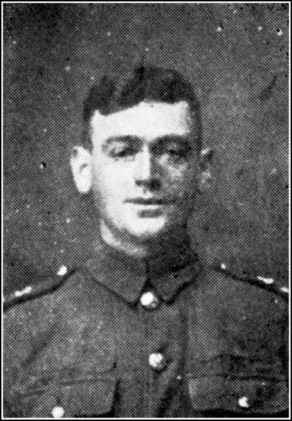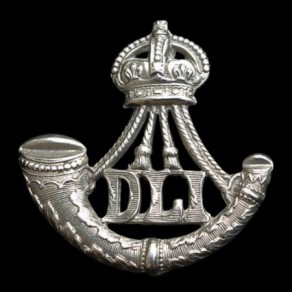18 May 1917
BURTON - Killed in action, May 3rd, Pte. Wm. Burton, of the Durham Light Infantry, of Gargrave, aged 30.
18 May 1917
PRIVATE WILLIAM BURTON KILLED
Enlisting from Silsden in the Durham Light Infantry on August 9th, 1916, Pte. Wm. Burton, No. 37746, has fallen a victim to the Huns, at the ago of 30. A gardener by occupation, he filled positions at Gargrave House, Scale House, near Rylstone, and at Moorfield, Silsden, and went to France on Nov. 21st last. He leaves a widow (a Gargrave woman) and two children. No official news has yet reached Mrs. Burton from the War Office, but she has received the following letter from a war pal, a Bradford man:- "Dear Mrs. Burton, - It is with deep and heartfelt sympathy I write to tell you that Will was killed in action on Thursday, May 3rd, by a shell on his way into the trenches, and the same shell also killed Fred Murphy and Tom Mitchell. We have all been pals together since coming out here and we feel the loss of all of them as if they were brothers. This is the saddest task I have ever undertaken to write you, but I feel he would rather we told you. May God be with you in your hour of trial, comfort you and strengthen you to face the future. Your grief is shared to a smaller extent by his sorrowing pals who have proved his worth out here in all circumstances. - Sincerely your friends, Wm. Ingham and Wm. Meares."
[Private William Edgar Ingham (37720) survived the war. Private William Meares (37712) was killed in action on the 10 May 1917 and is commemorated on the Arras Memorial to the Missing (Bay 8).]
15 June 1917
SILSDEN'S GALLANT HEROES - Memorial Service at the Parish Church
A service in memory of Pte. Fred Hardy, Pte. Edgar Raw, Pte. Harry Wade, Pte. Wm. Burton, Pte. W. Saddington, Pte. John Wm. Baldwin, and Pte. Charles Henry Gill, seven of Silsden's gallant heroes who have recently paid the great sacrifice for their King and country, was held at the Parish Church on Sunday morning last. There was a large congregation, and the service was conducted by Rev. E. E. Peters (vicar). As the congregation assembled the organist (Mr. Herbert Cooper) played 'O rest in the Lord,' and during the service the hymns 'The saints on earth, and those above,' 'On the Resurrection morning,' and 'O God our help in ages past' were sung.
In the course of his sermon, the vicar said they were met on that beautiful June morning when all seemed to speak of joy and gladness, in very solemn and very sad circumstances to the honour and glory of God, and to pay their tribute and respect and affection to the memory of seven gallant men who had given their lives for their country - Fred Hardy, Edgar Raw, Harry Wade, Wm. Burton, Willie Saddington, John Wm. Baldwin, and Charles Henry Gill. They were also by their presence, and by their taking part in that service, giving some expression to the heartfelt sympathy which they felt with their sorrowing relations. Fred Hardy had not been resident a great many years in Silsden, but he had many friends by reason of his cheerful disposition and his pleasant, amiable manners. When the call came he left his wife, and his happy and comfortable home, to go forth to do his duty. They all knew how he was wounded, brought to a casualty clearing station, and how for some days there was terrible anxiety as to how the balance would turn. During that time he either wrote himself, or dictated to the good and sympathetic Chaplain, most brave and cheerful letters in which he thought of his wife and not of himself. He derived great comfort from the consolation of religion, and the chaplain was able to write to his wife an assure her of how he died in the faith and fear of Jesus Christ.
Edgar Raw was one who gave an early answer when the call first came. He had not the pleasure of knowing him personally, but everyone spoke in the very highest terms of him, that he was a most excellent young man, active in religious work, and he left behind him a fragrant memory.
Now they came to one whose loss had been a peculiarly intimate one, to him a personal sorrow, for he knew him very well, and like everyone else who knew him, he had a great regard for him. He referred to Harry Wade, a young man of promise and of blameless character, a true simple-hearted Christian, a loyal churchman, a regular communicant, to whom he had the great privilege of administering on more than one occasion since he joined the army, that Holy Sacrament. He was a young man, home loving, and home keeping, yet one who felt it his duty to volunteer to defend his country. Although he had no tastes for the military life yet he made a thoroughly good soldier, one of whom his officer was able to speak in the very highest terms, one he said who showed his capability. He was always reliable, always trustworthy, and one whom he could choose to do important work, knowing that he would carry it out well. They knew how he had gone to the home above; he had left them, a very heavy loss indeed.
Then there was Wm. Burton who was not known probably to many of them, but those who did know him, had a very high esteem of him. He was a gardener, a man who was thoroughly efficient in his work, and took a very great delight in it. He was very comfortable in his home and happy with his wife and two children. He had gained the confidence and esteem of his employer. He and other three men were killed going to the trenches by a German shell.
Then they came to Willie Saddington, one of their own young men brought up in their Sunday School, and whom they all knew very well. He had the distinction of being one of the five soldiers, who at mobilisation at Silsden, was called up to the colours at the very beginning. He also believed that Pte. Saddington's father was another of that original five. He had honourable military traditions in his family. He was a Territorial, and as soon as war broke out, he at once volunteered for active service, but he was kept back in England for some time, being a member of the band. At last he went out, and he had not been long at the front when he fell doing his duty honourably and gallantly.
Then they came to John Wm. Baldwin, a man much older than those of whom he had spoken, a soldier of that old original regular army, a man who had served his country in South Africa, who had served his time on the reserve, a man time-expired when war broke out, and well over age, yet he at once volunteered to join the colours again. He was one of those who during those terrible months of the war maintained our cause against desperate odds. He was wounded at Hill 60 of bloody memory, and the scene last week of our great and glorious victory. He never recovered entirely from his wounds, his health was grievously affected, and he died at the hospital at Derby, where he had gained the affection of the staff, and was laid to rest in the Silsden Parish Churchyard with military honours in the presence of a large and sympathetic congregation.
It was only last week that they heard of the death of Charles Henry Gill, one whom the stern necessity of cruel war had made into a soldier. He was a young man of retiring disposition, reserved in his manners to the general public, but one filled with family affection and devoted to his home. He was not robust in health, but he had fallen a victim to the monster called into being by the Prussian lust of conquest.
There were three others he would speak of that morning, who were in a different category, and they hoped they would not have to mourn them as gone from them. They prayed that news might come of them. Three of their men were posted as missing - Sergt. W, Newnes, Pte. N. Phillip, and Pte. Jack Riley - all three intimately connected with that church and brought up in their Sunday School. W. Newnes was one of the most promising young men they had. He was a splendid young man, a choice young man, a Sunday School teacher, gymnastic, and athlete. He naturally made a very fine soldier, and gained the highest testimony from his officers and the men he commanded. The last that was heard of him was that he was seen risking his life for a wounded soldier. They prayed that it might be the will of the Almighty God to restore them back to their families again. They could ill afford to lose them. He wished on his own behalf, and on behalf of all present, to express their deepest sympathy with those there that day in great sorrow and affliction. It was hard to express in anything like adequate terms what they felt, but they all realised the inequality of the sacrifices was one of the sad things all through life, that some had to sacrifice so much, and others whether they were willing or unwilling, were not called upon to make sacrifices of a like character. He assured them that they appreciated in the most complete manner the offerings of their sons, of their husbands, and of those so near and dear to them, which they had made to the common cause of righteousness and truth.









No comments yet.